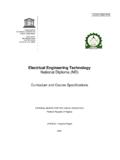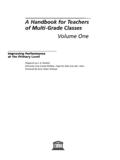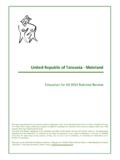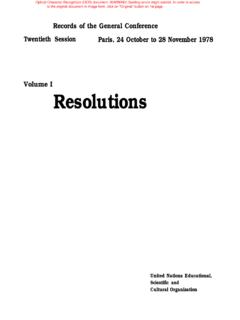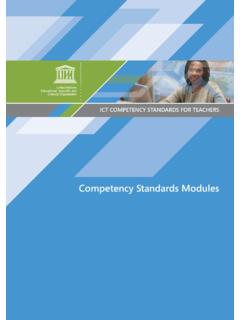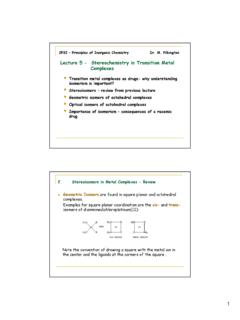Transcription of Science Laboratory Technology Chemistry Option …
1 ED/STV/2004/PI/16. Science Laboratory Technology Chemistry Option Higher National Diploma (HND). Curriculum and Course Specifications NATIONAL BOARD FOR TECHNICAL EDUCATION. Federal Republic of Nigeria UNESCO Nigeria Project 2004. Science Laboratory Technology Chemistry Option - Higher National Diploma (HND). Curriculum and Course Specifications November 2004. NATIONAL BOARD FOR TECHNICAL EDUCATION. Produced by the National Board for Technical Education (NBTE). Plot B, Bida Road, 2239, Kaduna Nigeria. TABLE OF CONTENTS. GENERAL 2. CURRICULUM TABLE .. 5. FIRST YEAR - FIRST 6. Course: Inorganic Chemistry I .. 6. Course: Physical Chemistry 12. Course: Organic Chemistry 20. Course: Analytical Chemistry I .. 30. Course: Laboratory Management .. 41. Course: General Instrumentation .. 48. Course: Higher Technical 55. FIRST YEAR - SECOND 59. Course: Polyfunctional 59. Course: Physical Chemistry II - (Chemical Kinetics).
2 66. Course: Industrial Chemistry .. 73. Course: Analytical Chemistry II .. 85. Course: Biochemistry for Chemists .. 94. Course: Biological and Chemical 105. Course: Research 117. SECOND YEAR - FIRST 124. Course: Inorganic Chemistry II .. 124. Course: Physical Chemistry III (Chemical Thermodynamics) .. 131. Course: Organic and Heterocyclic Chemistryh .. 139. Course: Analytical Chemistry III .. 147. Course: Petroleum and Petrochemicals .. 156. Course: Computer Applications in Chemistry .. 163. Course: Small Business Management II .. 173. SECOND YEAR - SECOND 180. Course: Medicinal 180. Course: Physical Chemistry IV (Electrochemistry and Photochemistry) .. 190. Course: Natural Products and Stereochemistry .. 198. Course: Food Chemistry and 206. Course: Forensic Biochemistry .. 214. Course: Higher Practical Project and Seminar .. 219. 1. GENERAL INFORMATION. CERTIFICATION AND TITLE OF THE PROGRAMME: The certificate to be awarded and the programme title shall read: HIGHER NATIONAL DIPLOMA IN Science Laboratory Technology - Chemistry Option .
3 A transcript showing all the courses taken and grades obtained shall be issued on demand. STRUCTURE OF PROGRAMME. The Higher National Diploma programme is structured to last for two years (four semesters). EVALUATION OR AWARD. All terminal Higher National Diploma programmes must be externally moderated after every five years. In grading the awards the Board's unified grading system should be applied. ACCREDITATION. All programmes leading to the award of Higher National Diploma in Chemistry must be accredited by the National Board for Technical Education. Details of accreditation of programmes are available from the Executive Secretary Programmes Department, National Board for Technical Education, Plot B' Bida Road, 2239, Kaduna, GOALS AND OBJECTIVES. The Higher National Diploma Programme in Chemistry is designed to produce technologists capable of carrying out various Laboratory analysis and practical works independently.
4 Specifically 1. Carry out chemical analysis and quality control in: industry (oil, food, brewing, detergent, textiles, etc.), hospitals, schools, colleges and research institutions. 2. Carry out general chemical work in industrial and academic laboratories. 3. Assist in biochemical analysis and experiments in hospitals, schools, colleges and research institutes 4. Prepare students for employment in related work such as sales, marketing, administration and management in the industries in 1 above and, also, for self-employment. ENTRY REQUIREMENTS: HIGHER NATIONAL DIPLOMA. The entry requirement into Higher National Diploma Programme in Science Laboratory Technology - Chemistry is at least a Lower Credit grade in National Diploma in Science obtained from an accredited Science programme with one year supervised Industrial Experience. In exceptional cases, at least two years Industrial Experience for candidates with Pass grade or any other equivalent certificate.
5 2. CURRICULUM. The curriculum of the HND programme consists of three main components. These are: (a) General studies/education (b) Foundation courses (c) Professional courses The General Studies/Education component shall include courses in: Language and Communication - English language and communication. This is compulsory. and Social Studies- Citizenship (the Nigeria constitution) is compulsory. The General Education component shall account for not more than 10% of total contact hours for the programme. Foundation Courses - Courses in mathematics and computer studies. The number of hours will vary with the programme and may account for about 10-15% of the total contact hours. Professional Courses - Courses which give the student the theory and practical skills he needs to practice his field of calling at the technician / technologist level. These may account for between 60-70% of the contact hours depending on programme.
6 CURRICULUM STRUCTURE. HND Programme: The structure of the HND Programme consists of four semesters of classroom, Laboratory and workshop activities in the college. Each semester shall be of 17 weeks duration made up as follows: 15 contact weeks of teaching, lecture and practical exercises, etc. and 2 weeks for tests, quizzes, examinations and registration. CONDITONS FOR THE AWARD OF THE ND. Institutions offer accredited programmes for the award of the Higher National Diploma to candidates who successfully complete the programme after passing prescribed course work, examinations and project. Such candidates should have completed a minimum of between 90% and 100% of credit units depending on the programme. Higher Diplomas shall be awarded based on the following classifications: Distinction - CGPA Upper credit - CGPA Lower Credit - CGPA Pass - CGPA GUIDANCE NOTES FOR TEACHERS TECHING THE PROGRAMME.
7 The new curriculum is drawn in unit courses. This is in keeping with the provisions of the National policy on Education, which stress the need to introduce the semester credit units which will enable a student who so wish to transfer the units already complete in an institution of similar standard from which he is transferring. 3. In designing the units, the principle of the modular system has been adopted; thus making each of the professional modules, when completed self-sufficient and providing the student with technician operative skills, which can be used for employment purposes. As the success of the credit unit system depends on the articulation of programmes between the institutions and industry, the curriculum content has been written in terms of behavioural objectives, so that it is clear to all, the expected performance of the student who successfully completed some of the courses or the diplomates of programme is clearly defined.
8 There is a slight departure in the presentation of the performance based curriculum which required the conditions under which the performance are expected to be carried out and the criteria for the acceptable levels of performance. It is a deliberate attempt to further involve the performance that can take place and to follow that with the criteria for determining an acceptable level of performance. Departmental submission on the final curriculum may be vetted by the academic board of the institution. Our aim is to continue to see to it that a solid internal evaluation system exists in each institution for ensuring minimum standard and quality of education in the programmes offered throughout the polytechnic system. The teaching of the theory and practical work should, always where possible, be integrated. Practical exercise, especially those in professional courses and Laboratory work should not be taught in isolation from the theory.
9 For each course, there should be a balance of theory to practice depending on the course objectives and content. Life data, case studies, mini-projects and visits to and from available organizations should be incorporated wherever and whenever possible. 4. CURRICULUM TABLE. HIGHER NATIONAL DIPLOMA IN Science Laboratory Technology - Chemistry Option . FIRST YEAR - FIRST SEMESTER. Course Code Course Title L P CU CH Prerequisite STC 311 Inorganic Chemistry I 2 3 5. STC 312 Physical Chemistry I 2 3 5. STC 313 Organic Chemistry I 2 3 5. STC 314 Analytical Chemistry I 2 3 5. GLT 311 Laboratory Management 2 0 2. GLT 312 General Instrumentation 2 3 5. STC 316 Higher Technical English 2 3 5. TOTAL 14 18 32. FIRST YEAR - SECOND SEMESTER. Course Code Course Title L P CH Prerequisite STC 321 Polyfunctional Compounds 2 3 5. STC 322 Physical Chemistry II (Chemical Kinetics) 2 3 5. STC 323 Industrial Chemistry 2 3 5.
10 STC 324 Analytical Chemistry II 2 3 5. STC 325 Biochemistry for Chemists 2 3 5. GLT 323 Biological and Chemical 2 3 5. STC 326 Instrumentation Research Methods 2 2 4. TOTAL 14 20 34. SECOND YEAR - FIRST SEMESTER. Course Code Course Title L P CH Prerequisite STC 411 Inorganic Chemistry II 2 3 5. STC 412 Physical Chemistry III (Chemical Thermodynamics) 2 3 5. STC 413 Organic and Heterocyclic Chemistry 2 3 5. STC 414 Analytical Chemistry III 2 3 5. STC 415 Petroleum and Petrochemicals 2 3 5. STC 416 Computer Applications in Chemistry 1 3 4. STA 418 Small Business Management II 1 1 2. TOTAL 12 19 31. SECOND YEAR - SECOND SEMESTER. Course Code Course Title L P CU CH Prerequisite STC 421 Medicinal Chemistry 2 3 5. STC 422 Physical Chemistry IV (Electrochemistry and Photochemistry) 2 3 5. STC 423 Natural Products and Stereochemistry 2 3 5. STC 424 Food Chemistry and Brewing 2 2 4. STH 422 Forensic Biochemistry 1 3 4.
